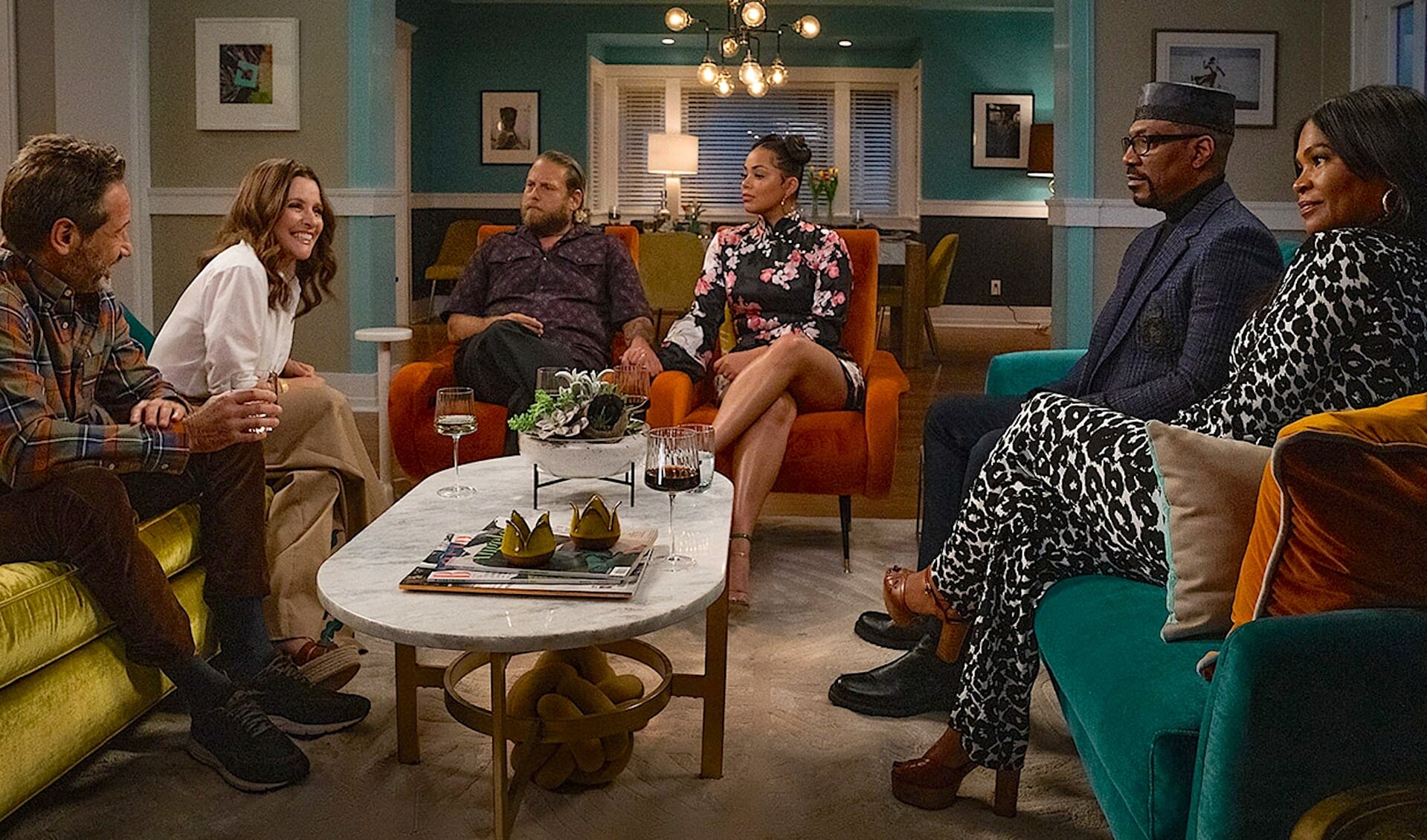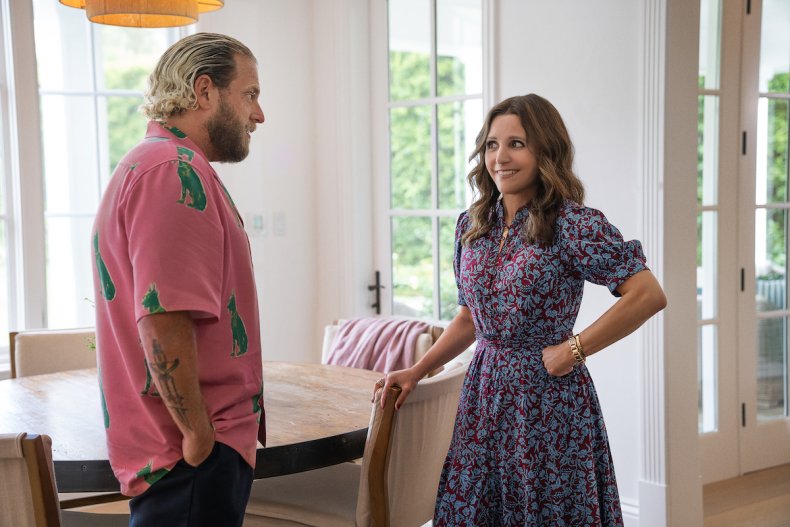Given the complexity of what they’re trying to pull off with You People, Kenya Barris and Jonah Hill might need to be cut some slack if they falter a bit in their execution. The successful television creator serving here as co-writer and director (Barris) and his star and writing partner on this project (Hill) are trying to give us a comedy – a romantic comedy, no less – that makes us tremendously uncomfortable about racist microaggressions, while still being funny. It’s the latter that’s sacrificed a bit here, though the loss of laughs might be made up for by the useful discussions the film engenders.
Race has always been a matter of interest for Barris, whose most acclaimed credit is the TV show Black-ish. That title alone should indicate his intention to confront viewers with the way people publicly perform, talk about, or fly in the face of certain cultural expectations that arise from a person’s skin colour. Hill is newer to this sort of material, but his choices have always represented an intelligent engagement with the social discourse. He’d like to be woke as much as anyone, and comes across as such more often than not.
The story they’ve given us is an interracial relationship where each person’s parents just don’t know what to do with the person their child has chosen to spend their life with. Hill plays Ezra, a Jewish podcast host who doesn’t represent too many of his parents’ desires for him as a member of their faith. He’s into hip hop culture (that’s the subject of his podcast, which he hosts with a Black partner, played by Sam Jay), and if his love of this adopted culture didn’t come across as so genuine, he’d probably be accused of appropriation.
At a curb side one day he accidentally gets into the car of Amira (Lauren London), who works in marketing, mistaking her for his Uber driver. So their relationship actually starts with a racist microaggression, though Ezra quickly shows Amira a picture of his actual Uber driver, who does bear a striking resemblance to her. Still eager to make up for her initial hurt feelings, he offers to show her around – even though it appears she’s also from L.A. – and they begin dating.
Cultural differences that don’t matter to them become magnified when the parents get involved. Ezra’s parents are Shelley (Julia Louis-Dreyfus) and Arnold (David Duchovny), and they’re the types of people who pander and try too hard in awkward situations. It’s quite the awkward situation when they first meet Amira, and bend over backwards to show how much they might relate to her, instead just demonstrating how much they don’t. They’re the couple you thought Bradley Whitford and Catherine Keener might be in Get Out before all the, you know, brain swapping.
Amira’s parents are no better. Akbar (Eddie Murphy) and Fatima (Nia Long) are Muslims, and they look at Ezra sideways from the first time they shake his hand. That could be because he’s got his parents’ awkwardness and fumbles every attempt to seem breezy in this crucial interaction, but they are also inherently distrustful of white people, never having expected their daughter to select one for herself. When they mention Louis Farrakhan, who made headlines for unfortunate comments about Jewish people, at a get-to-know you dinner with Ezra’s parents, it sends things spiralling. Then again, Ezra didn’t start things very well by inviting them to L.A. institution Roscoe’s Chicken and Waffles to get their blessing on a proposal to their daughter, and Shelley and Arnold only make things worse by stumbling through the beginning of this meeting. It doesn’t help when Shelley accidentally lights Akbar’s kufi on fire.
When depicting racism on film, there are two ways to go about it. You can soft-pedal it and make it seem comparatively harmless, as you would do in most comedies that just want to go down easy, or you can give it some teeth and make the audience squirm. Barris and Hill have given it teeth in a movie that otherwise profiles as trying to go down easy. The two are probably not natural collaborators as writers, and not because of the differences in the colours of their skin. Hill is a descendant of the lighter school of Judd Apatow bro humour, which is evident in the scenes he clearly wrote. Barris has less of an instinct to sell out his principles for a laugh.
And so the result is that there are not a lot of laughs, which is a problematic outcome when the movie is structured as a series of outrageous set pieces in a standard comedy format. As you’re watching, you can tell the scene calls for a laugh, if you are at all a student of how these films are written. The punchline, though, is usually a cringe rather than a laugh, and sometimes these seem exaggerated beyond what might really happen. And while cringing is valuable, especially since it forces you to confront the true irreconcilable differences that are being explored here, you sometimes get the impression the filmmakers wanted the laugh but couldn’t deliver it.
If you’re here for an honest discussion of the real roadblocks to interracial romance, though, You People is your movie. There are two primary forms of racism depicted here, and to their credit, Barris and Hill never make one seem worse than the other. Ezra’s parents are aware of what’s required of them as political liberals, but even in “trying” to meet that standard, they botch it with word choices and instances of othering that even most clueless people would know to avoid. Then you have the more overt racism of Amira’s parents, which might be justified given the historic injustices visited on American Black people by American white people. However, the fact of there being specific objections they have to Judaism makes it all the more real and confrontational.
Perhaps the sheer length of the movie, which is nearly two hours, creates some pacing problems, some perception that they’ve hit the salient points already and now are just becoming redundant. The schools of comedy both men come from have erred on the side of excessive length, as Hill’s mentor, Apatow, is known for driving his comedies toward two-and-a-half hours, and even the TV-raised Barris made the Netflix sitcom in which he starred, #BlackAF, ten minutes longer than standard sitcom length, blunting its impact.
You People ends up on the right side of the divide between worthwhile and not, though, because its intentions feel so earnest. The conversations that could be inspired by this movie are worth having, and the people they’ve gotten to stimulate those conversations – a real all-star cast of talented actors and comedians – lend the effort additional credibility. Conversations about race are inherently awkward, and if some of that spills over into the way You People plays out, it’s worth it for getting us there in the end.
You People is currently streaming on Netflix.



